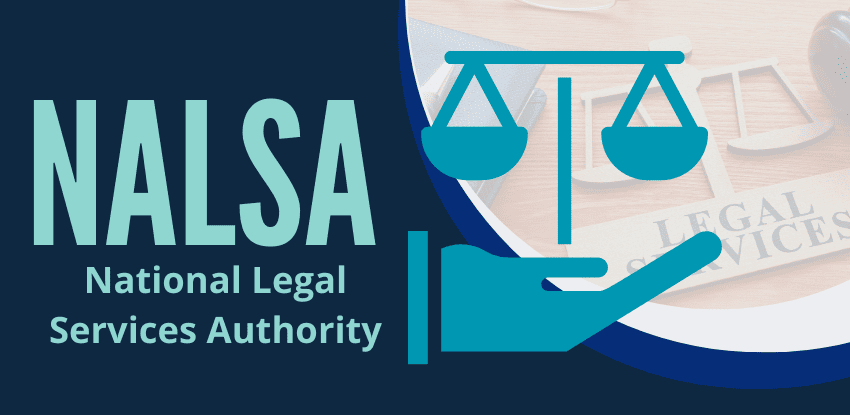+91 9990898327
Office : 632, Dr. Mukherjee Nagar, Delhi 110009
Mon-Sun: 09:00AM - 08:00PM

NALSA was founded in 1995 to check the effectiveness of legal aid programs and make rules for providing legal services under the Act. Hon’ble Dr Justice D. Y. Chandrachud, The Chief Justice of India, is the Patron-in-Chief of NALSA.
NALSA's objective is to provide legal services free of cost to the weaker sections of society based on equal opportunity. It also issues guidelines for the State Legal Services Authorities on implementing legal schemes and programs across India.
Legal aid refers to providing assistance to people who otherwise would not have been able to afford legal representation and access to the legal system. In India, many poor and weak people are denied equality in the opportunity to get justice. Legal aid ensures the preservation of the rule of law, which is imperative for the existence of an orderly society.
NALSA was founded in 1995 under the Legal Services Authorities Act of 1987. Parliament passed the Act, which came into force on 9 November 1995, to establish a nationwide uniform network for providing free and competent legal services to the weaker section of society on the basis of equal opportunity.
NALSA provides free legal services to the poor and marginalized in civil and criminal matters. Legal aid includes all kinds of expenses, drafting of legal documents, and services of an advocate.
The vision of NALSA is to promote an inclusive legal system that ensures justice for the underprivileged sector.
NALSA also aims to spread legal literacy through legal awareness camps, print and digital media, and the organization of Lok Adalats for peaceful dispute settlement.
The Chief Justice of India is the Patron-in-Chief.
The Second senior judge of the Supreme Court of India is the Executive Chairman.
SLSA is headed by the Chief Justice of the respective High Court, who is the Patron-in-Chief. A serving or retired judge of the High Court is nominated as its executive chairman. The organization has been formed to implement the policies and directions of NALSA, provide free legal services to the people, and conduct Lok Adalat in the State.
DSLAs are situated in the District Courts Complex in every district. The District Judge of the respective district is its ex-officio Chairman. They are formed to implement legal services programs in the districts.
The Taluk Legal Services Committee is established for every Taluk or a group of Taluk to coordinate the activities of legal services in the Taluk and organize Lok Adalats. The entire committee is headed by a senior civil judge operating within the committee’s jurisdiction, who is its ex-officio chairman.
NALSA provides free legal aid and advice to the weaker sections of society. The legal aid includes advising the beneficiaries to take advantage of the welfare statutes and schemes framed by the Central or State Government.
NALSA conducts Lok Adalats as an alternative dispute redressal mechanism. At the Lok Adalats, disputes pending in the court are settled peacefully.
To ensure that people know about their rights and various legal services institutions, NALSA conducts seminars, distributes pamphlets, and conducts competitions like painting, essay writing, debate and nukkad nataks to create awareness.
Under NALSA’s Para-Legal Volunteers Scheme, paralegals are trained as intermediaries, bridging the gap between common people and legal services institutions.
The legal aid clinics are intended to provide legal relief to the backward sections of society. The Scheme aims to provide inexpensive local machinery for rendering essential legal services like legal advice and drafting of petitions, notices, replies, applications, and other documents of legal importance.
The victim compensation scheme applies to the victims and their dependent (s) who have suffered loss or injury as a result of the offence committed and require rehabilitation.
Through the Child-Friendly Services to Children and Their Protection Scheme, 2015, NALSA aims to improve children's access to justice. The primary purpose is to ensure that the existing legislation and policies in favour of children are implemented properly and to provide legal assistance to children who need care and protection from the law.
Every District Legal Services Authority must establish a Prison Legal Aid Clinic within the premises of every prison under its jurisdiction. The objective of this program is to provide meaningful, efficient, and effective legal assistance to prisoners.
Two neighbours constantly tormented a 33-year-old resident in a Delhi slum, Nagma Begum. The neighbours used to get drunk, throat garbage at her house, and hit and threaten her. If she tried to protest, then things got worse for her. Nagma Begum did not know about this. The free legal aid provided by NALSA. However, she met a student volunteer from Delhi University’s DSLA one day near her house. Then, the case was taken up by the higher police authority, who took the neighbours to task and got them to give a written apology. Since then, the neighbours have stopped troubling her, and now, Nagma helps her neighbours bring such cases to the light.
https://drive.google.com/file/d/1_-FL1R7J6mV70C00o9q5L7fv6j4M0J-5/view
The challenges that hinder NALSA’s operations are -
To enhance NALSA’s effectiveness, Alternative Dispute Resolution (ADR) methods like mediation and conciliation should be used. These methods will speed up the resolution process and also reduce costs.
The National Legal Services Authority (NALSA) was founded in 1995 under the Legal Services Authorities Act of 1987. To provide legal assistance to the poor and marginalized, NALSA has established legal aid clinics, Lok Adalats, and several legal awareness camps.
The services of NALSA can be availed by -
One of the functions of NALSA is to organize Lok Adalats. Lok Adalats is an Alternative Dispute Resolution Mechanism where the pending cases are settled amicably.
Paralegals help spread awareness about free legal services among the poor and marginalized sections of society, thereby bridging the gap.
You can call 15100 (Toll-free number) or visit the nearest Legal Service Institution.
Post a comment